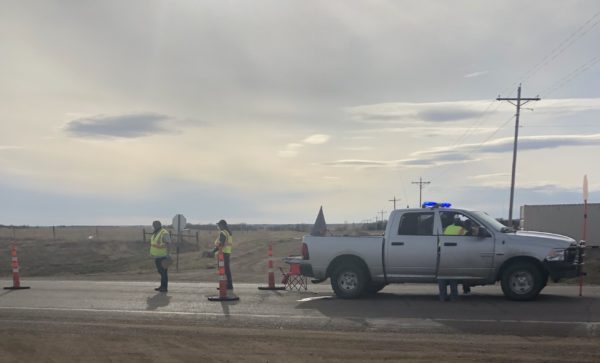
- Details
- By Native News Online Staff
EAGLE BUTTE, S.D. — The Cheyenne River Sioux Tribe (Tribe) on Tuesday filed a complaint against President Donald Trump and 10 other members of his administration, including Mark Meadows, the White House chief of staff; David Bernhardt, secretary of the Interior; Tara MacLean Sweeney, assistant secretary-Indian Affairs, Department of the Interior; and Dr. Deborah Birx, White House coronavirus response coordinator.
The lawsuit alleges the Trump administration abused federal authority to force the Tribe to dismantle health checkpoints it uses to screen people for COVID-19 coming onto its reservation in central South Dakota.
The lawsuit filed in U.S. District Court for the District of Columbia alleges repeated demands and threats from White House officials, including Assistant Secretary Sweeney and Dr. Birx, who is known for wearing a scarf at the White House coronavirus briefings.
The lawsuit also alleges that when the Tribe failed to capitulate to the Trump Administration’s demands and threats, the defendants then engaged in an unlawful attack on the Tribe’s law enforcement funding and powers of self-governance.
As COVID-19 began to spread across the country in late March, the tribal chairman of the Tribe had ordered setting up checkpoints that would limit non-reservation travelers into the Cheyenne River Indian Reservations.
“The Tribe’s health safety checkpoints are a lawful exercise of our sovereign authority and intended to protect our people from sickness and death. And it’s working,” Nicole Ducheneaux (Cheyenne River Sioux Tribe), attorney for the Tribe and a partner of Big Law & Policy Group, the law firm that filed the legal action on behalf of the Tribe.
In the lawsuit, the Tribe argues the checkpoints have been successful.
“The Tribe has had only six reported cases of COVID-19 on its Reservation, and each of those cases can be traced to entries identified through the Tribe’s Health Safety Checkpoint informational system. To date, there has been no community spread of COVID-19 and no deaths,” the lawsuit states.
The health safety checkpoints drew national attention two months ago when South Dakota Governor Kristi Noem told the Tribe and the neighboring Oglala Sioux Tribe to shut down their checkpoints. Both tribes refused and a showdown ensued.
The governor then turned to the federal government for help ending the showdown with the tribes over the health safety checkpoints.
The lawsuit chronicles several calls made from the White House and the Interior Department. The complaint alleges top Trump administration officials colluded to both coerce and punish the Tribe for keeping the checkpoints in place.
“When the Tribe informed White House and agency officials that they were not going to end their health checkpoints, the Tribe’s law enforcement funding was pulled in the middle of the coronavirus pandemic, leaving an already vulnerable population to deal with yet another health and safety crisis,” Ducheneaux said.
The lawsuit seeks relief from the federal district to allow for the continuance of the health safety checkpoints and to ensure the federal government does not close them down.
“The Tribe will exercise its sovereign authority to the fullest extent to protect its tribal citizens. We have faced pandemics and we have faced fights with the United States before. We know how to fight, and we will protect ourselves,” Ducheneaux said.
Other Big Fire attorneys representing the Tribe are Senior Attorneys Rose Weckenmann and Judy Shapiro.
More Stories Like This
Native News Weekly (August 25, 2024): D.C. BriefsUS Presidents in Their Own Words Concerning American Indians
Two Murdered on Colville Indian Reservation
NDAA passes House; Lumbee Fairness Act Advances
NFL, Vikings to Host Native All-American Game, Youth Flag Clinic
Help us defend tribal sovereignty.
At Native News Online, our mission is rooted in telling the stories that strengthen sovereignty and uplift Indigenous voices — not just at year’s end, but every single day.
Because of your generosity last year, we were able to keep our reporters on the ground in tribal communities, at national gatherings and in the halls of Congress — covering the issues that matter most to Indian Country: sovereignty, culture, education, health and economic opportunity.
That support sustained us through a tough year in 2025. Now, as we look to the year ahead, we need your help right now to ensure warrior journalism remains strong — reporting that defends tribal sovereignty, amplifies Native truth, and holds power accountable.
 The stakes couldn't be higher. Your support keeps Native voices heard, Native stories told and Native sovereignty defended.
The stakes couldn't be higher. Your support keeps Native voices heard, Native stories told and Native sovereignty defended.
Stand with Warrior Journalism today.
Levi Rickert (Potawatomi), Editor & Publisher

